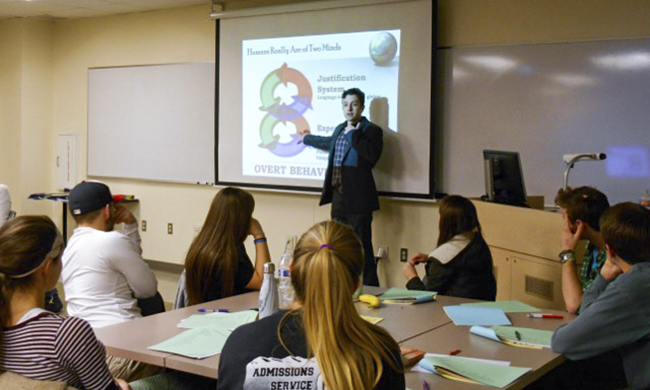Building Cultural Competency Workshop making a change in health care
College of Health and Behavioral StudiesSUMMARY: Since 2002, JMU's Institute for Innovation in Health and Human Services (IIHHS) has offered the Building Cultural Competency Workshop (BCCW) two or three times a semester to provide a forum for participants across health professions to discuss personal, professional and institutional dynamics that influence the quality of patient care and interactions with colleagues.
By: Lauren Mitchell '19
Creative Services

Since 2002, JMU’s Institute for Innovation in Health and Human Services (IIHHS) has offered the Building Cultural Competency Workshop (BCCW) two or three times a semester to provide a forum for participants across health professions to discuss personal, professional and institutional dynamics that influence the quality of patient care and interactions with colleagues. Participants are invited to examine personal and institutional values that influence their thoughts, feelings and actions that may influence their quality of patient care. Since 2002, over 3,000 students have participated in the Building Cultural Competency Workshop. Emily Akerson, Anne Stewart, Art Dean and Marsha Mays Bernard have been involved in planning the workshop.
The BCCW explores issues of diversity, power and privilege in developing a greater awareness of one’s own and others social identities including race, religion, sexual orientation, socio-economic status, ability, age, and gender, or any other identity to which one attaches meaning or significance. The subject matter of the workshop is part of the coursework in all health-related academic programs, so the students come with some prior knowledge. However, it is helpful to work through these issues with other health professionals in an interprofessional context. This experiential workshop focuses on developing increased cultural awareness with the goal of enhancing the quality of their care and services, professional interactions and their interactions with colleagues. Short presentations are followed by activities and discussions that reinforce the topics that were presented. The activities are done in groups of eight students of different disciplines and one facilitator. “The workshop provides participants an opportunity to become more aware of who they are and to respond to the Madison Collaborative’s 8 Key Questions to answer the question “What actions will help me become my ideal self?” Emily Akerson, the coordinator of the event, said.
For the last two years, the BCCW has benefitted from contributions by Chance McDermott, a doctoral student in the Combined-Integrated psychology program. He presents the justification hypothesis or “two minds”, a theoretical framework developed by Graduate Psychology C-I program director, Gregg Henriques. His presentation is about how children develop internal rules about right and wrong. According to Henriques’ research, rules about what is good and what is bad are not objective things, but rather learned through experience and interaction with others. These rules vary in different societies, which can lead to misunderstandings. “It can be uncomfortable to encounter unfamiliar cultures, so it is best to be aware rather than to ignore it and pretend that it is not there,” McDermott explained. The workshop provides a safe place for dialog about the challenging topic of diversity and cultural difference. The BCCW gives students a space to discuss what makes these situations difficult and work through these difficulties together. This process allows students to talk about things comfortably and in turn, produces change in the student’s perspective.
Another topic discussed during the BCCW is the startling trend in disparities in health care for minorities and those of a lower socio-economic status. These patients are not receiving the same quality of care, leading to poorer outcomes. The BCCW looks at how professionals can help create an inclusive environment for patients and become the healers they hope to become. By inviting students across health care professions, students can look at what they can do interpersonally and at a systems level to work toward positive change and reduce health disparities.
Chance McDermott and the planning team have been invited to present at regional and international meetings on the workshop. McDermott was asked to be a co-presenter at the Eastern Conference on the Teaching of Psychology and Collaborating Across Borders- V (CAB-V) international conference where he explained how the workshop is facilitated and how it can be incorporated into other universities and programs. “It was inspiring to be with so many strong leaders in their fields who are so earnestly interested in finding better ways to relate and interact across disciplines, countries and perspectives,” McDermott described. Cultural competency is a lifelong journey because we can be blind or insensitive to another person’s experiences but the BCCW is a good place to begin this journey.

